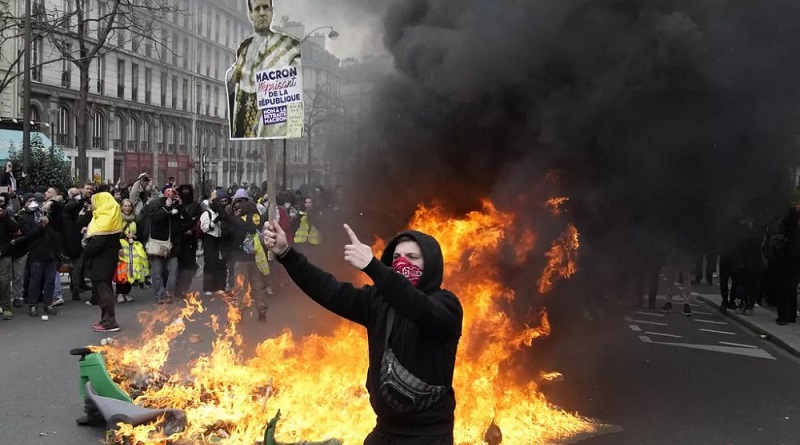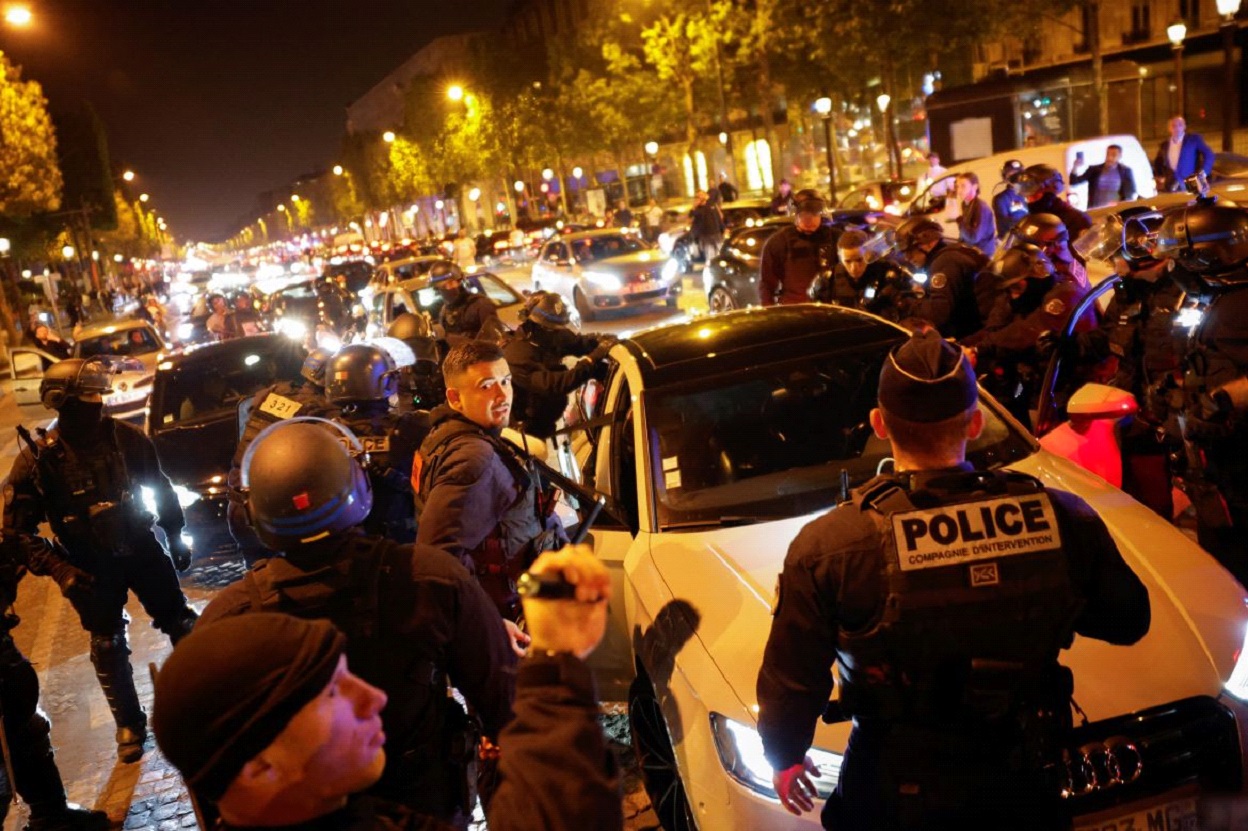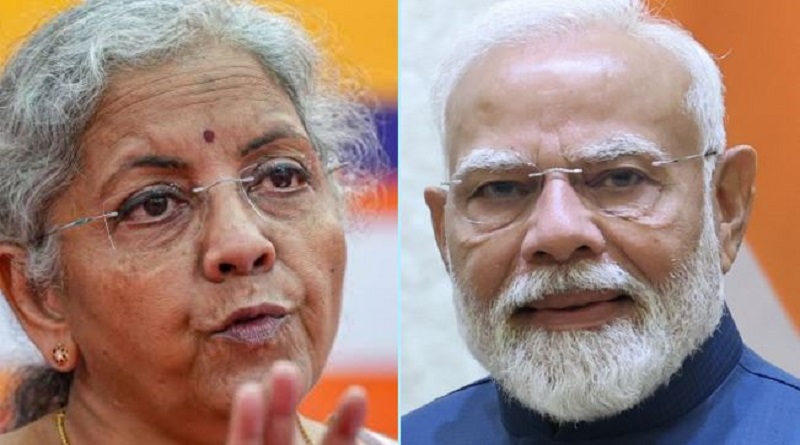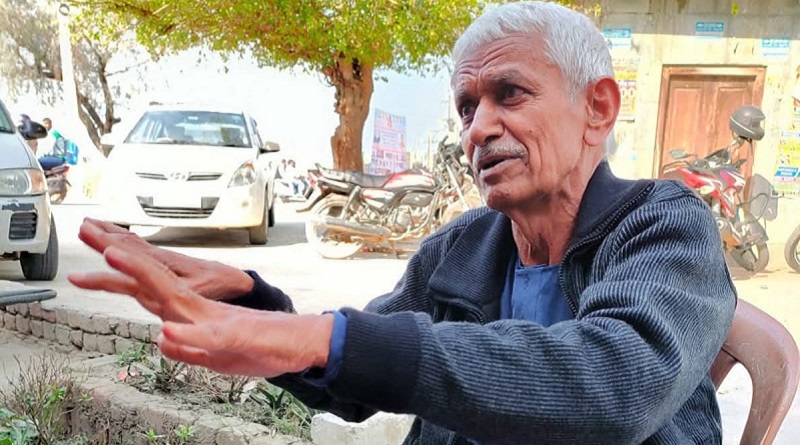French Riots manifest neo-fascism of unscaled levels

BY Harsh Thakor
On the morning of Tuesday, June 27 In Nanterre, a suburb of Paris, French neo-fascism was ressurected at a full brim.
The police killed a 17-year-old teenager called Nahel Merzouk. The incident occurred after Nahel and his two passengers were pulled over by the police near Nanterre-Prefecture train station.
One of the officers pointed a gun at Nahel’s head and threatened him—shouting “Hurry up! Or you’ll get a bullet in the head!”—and hit him. Terrified, Nahel took his foot off the brake of his automatic transmission car, which was starting to move forward again.
Initially, the police attempted to cover the blame by claiming it as an act of self-defence, but a video of incident certified the truth. Not only had the police murdered a young man, but they had also tried to blame the victim for his own death. In a working-class suburb where residents have been continuously victims of police harassment and violence for decades, this most recent police crime was the final nail in the coffin.
This revolt is a sequel of a long list of such mass rebellions in France. It began in 2005 with the three-weeks-long uprising in the Banlieus ,to the 2006 youth protests, the Villiers-le-Bel riots in 2007, the students uproar from 2007 to 2009, the riots in July 2009, the Trappes riots in 2013, the Sarcelles riots in 2014, the Corsica unrest in 2022, the yellow vest movement to the struggle against the pension reforms. However, the intensity and impact in July 2023 has surpassed all these previous ones.
More than 800 police officers have been injured.More than 1,000 buildings were damaged. At least 250 police stations were attacked. More than 200 towns affected. More than 5,500 cars have been set ablaze. Much more than one billion euro damage was caused. More than 3,300 people have been arrested.
Public anger and retaliation
The public anger soon spread like wildfire, escalating like a spark turning into a Prairie fire… Uprsisngs broke out in several French cities, including Lyon, Bordeaux, Toulouse, and Lille. People expressed their anger by starting fires, burning cars and public buildings, as well as clashing with the police.
In retailiation, group of youths besieged a public finance center near Nancy, protesting about the class-based tax system. The destruction in wealthy districts of Paris, such as Rue de Rivoli and the 12th Arrondissement, created tremors in the camp or shook the feet of French bourgeois society.
The burning of the Olympic Games construction site reflected the militant slogan of the pension reform movement: “No withdrawal [of the pension reform bill], no Olympics!”4 In Lyon, when fascist groups ambushed young people from immigrant backgrounds, they heroically retaliated.
The riots in France, ignited by the death of Nahel at the hands of police, 'highlight the widening gap between a section of the population and the institutions that are supposed to protect them.' 🇫🇷💥
Bi-diplôme student Théo, blogs about it here.🔗 https://t.co/I3I5LNUUp7 pic.twitter.com/QdRDFKtFBm
— School of Politics & International Relations (@UniKentPolitics) July 26, 2023
Racism and Police violence
Its important to note that the victim was not just any young man: but was a young, non-white working-class male. Notably police violence affects Black and Arab people 20 times more than white people, according to a 2017 report by the French Ombudsman.6
Two young demonstrators in the Paganini neighborhood in Paris’ 20th Arrondissement narrated about their everyday experience as Arabs in the presence of the police: “They’re always putting on pressure, they’re always passing by, it’s all unnecessary checks, insults, remarks, it’s all the time. It’s non-stop. And there are no breaks, no respite. They spit in our faces, they insult us, they give us unfair fines. They set the rules and we exist as their servants. They want us to do as they please.”
It is not just a question of racism within the ranks of the police the same is true for employment: according to another study conducted by the same institution, “in metropolitan France, real or supposed [immigrant] origin is the second most common criterion for discrimination after gender” and “11% of individuals declare having experienced one or more discrimination(s) on the grounds of [immigrant] origin or skin color over the past five years.”
The report also mentions that “Men who are descendants of immigrants from North or Sub-Saharan Africa […] have an average monthly salary that is 7% lower than that of men with no migratory ancestry.” Here we witness a methodical integration of economic exploitation and racism.
Police violence against people of colour has escalated tenfold in the suburbs, where thousands of poor immigrants and descendants of immigrants are languishing in appalling housing conditions.. The authorities’ determination to preserve racist, class-based monopoly has led to numerous deaths among the inhabitants of these neighbourhoods.
However police brutality is not even considered a form of violence in French society, mainly because of the media coverage that justifies police repression and demonizes the resistance by local youths. 2 protesters in the Paganini district recounted : “The problem in France is that violence is pointed out when it involves us, the blacks and Arabs because a young person who lights a firecracker on the police is going to be considered more shocking than a policeman who rams a baton into a young person’s anus, as was the case with young Théo a couple of years ago. ‘
KTF News Video – Over 1,000 buildings have been burnt and 5,600 cars destroyed in first week of riots in France – https://t.co/A4Ik51Xfzj pic.twitter.com/pQgW8FWFBy
— KEEP the FAITH (@KTFministry) August 2, 2023
Colonial history and Immigration
France from the end of the 19th century onwards, it grabbed vast colonies, particularly in West Africa: Senegal, Niger, Benin, the Ivory Coast, and others. Specific legislation (“Code de l’indigénat”) was soon introduced for the indigenous populations, targeting them to a system of laws far more repressive than those imposed on the French.
As a result, colonies rich in natural resources (palm oil, dyewood, rubber, etc.) were plundered by French companies for over seven decades.
Throughout this period, revolts by oppressed peoples confronted the colonial regime, but it was only in the second half of the last century that these struggles crystallised , paving way for independence to come to the fore.. Although most of the French colonies formally gained political independence between 1945 and 1977, French multinationals often retained control of key economic sectors.
After so many years of colonial subjugation by France the French imperialists fuelled destructive civil wars in order to disintegrate the newly formed states’ attempts to take control of parts of their economy. This caused many workers from the Congo, Tunisia, Algeria, Senegal, and other countries to vacate their countries, lured by French companies to work in sectors that paid low wages and lacked adequate conditions..
When they arrived in France, they were subjected to appalling working conditions. State-owned companies were just as bad as the private sector, illustrated by the example of the “Chibanis” (“white haired-ones” in Arabic) railway workers, who only very recently won their case against the state-owned rail company (SNCF),13 which had discriminated against them for decades by paying them below the statutory wage rates.
When capitalism was on the brink of collapsing from the 1970s onwards, the first victims were the immigrant workers. Mass unemployment, forced them to flee out of city centers, where rents continued to rise, partly as a result of gentrification many poor people of color were forced into the suburbs abandoned by the State.
The French state’s task in relation to these exterminated populations has consistently been to strangulate them within the suburbs and quash any revolt against their deteriorating conditions. Police control has been intensified year after year to the point of crushing any freedom of movement and expression.
The most recent development in the militarization and surveillance of so-called “sensitive” neighbourhoods is called “Reconquête Républicaine,” (“Republican Reconquest,” instituted in 2018), which involves the deployment of several thousand additional police officers engulfing entire France to completely strangulate the outcasts in their neighborhoods.
https://twitter.com/TonySeruga/status/1686715368063283200
Conspiracy of Social Media
The day after the murder, a massive media operation was undertaken with objective of absolving the police officers guilty of the murder and accusing the victim of causing his own death.
Without ever saying it openly, public and private television stations illustrate that it is justifiable for an armed policeman to kill a young person, regardless of whether he poses a “real” threat.
On TV and social media, the far right’s rhetoric on the barbarization of French society—was in consonance with the fascist theory of the “Grand replacement” (i.e. the replacement of whites by Arabs )while the left is divided on the issue and is struggling to formulate a clear cut defence of the youth on the streets as well as clear opposition to police violence.”
“Far-right presidential candidate Eric Zemmour warned of the danger of an imminent “ethnic” and “racial” war17—instigating a Tsunami and giving impetus to the most right-wing elements of the police who asserted that they are threatened by the forces of “Islamo-Leftism.”
Never knew that #SonuManesar was in France too…is it so difficult to understand the root cause behind all the riots ? #NuhConspiracy #Mewat #NuhViolence #FranceRiots #HaryanaClash pic.twitter.com/5y7p5ObeTR
— Varun Jamwaal 🪷 (@VarunJamwaal) August 3, 2023
Nature of Riots
In terms of the style of revolt—arson, clashes between police and the youth—the 2005 riots were similar to the current .However overall there is an important dichtonomy.
In 2005, the major anti-government struggles still mostly took place within the arena of organised framework of the trade union movement when capitalism and French political institutions still had some moral vestiges, which paved path to the government to make more concessions to the movements.
Now, the slightest repressive step by the police ignites and escalates massive revolts which political parties and trade unions cannot check.
The racism which deeply penetrated the institutions of French society echoes what we see in other European imperialist countries, such as the UK and Germany.
A major contradiction that progressive and anti-racist forces will have to resolve in the future , is how to galvanise burning rage into a large-scale political movement capable of giving a knockout punch to the status quo.
Suburban communities don’t trust politicians who follow them merely out of opportunism by patronising identity politics and sponsor racist oppression and capitalist exploitation.
Quoting Shahin “When left-wing MP Carlos Martens Bilongo came to the Pablo Picasso neighborhood in Nanterre to talk to the people, to say he was with them, the residents chased him away. They told him to leave. Because politicians want us to vote for them, but once they’re elected, […] they go on with their lives, and it’s never made any difference to us.”
Poll: 70% in France Don’t Trust Macron to Keep them Safe 🙂🙂
Emmanuel Macron’s promise to restore order in the country – following violent riots – has done little to sway public fears. (CSA survey for CNews)
The 🇫🇷 president’s statement was part of a pic.twitter.com/vibajbDTEq
— Naren Mukherjee (@NMukherjee6) July 29, 2023
International Impact
The riots have also spread to the French colonies in the Caribbean, where clashes, damaged buildings and cars were reported. In Cayenne, Guiana, the protesters were reported to have shot at the police.
The worst violence so far was in French Guiana, where authorities said that police officers came under fire and that a stray bullet from rioters killed a 54-year-old government worker late Thursday, June 29, in the region’s capital city Cayenne.
In Cayenne police tried to quell protesters in the small territory on the shoulder of South America. Smaller demonstrations also were reported in the French Caribbean islands of Martinique and Guadeloupe, where no injuries or deaths were reported.
Sectarianism amongst Left Forces
The French Communist Party called for “peaceful” demonstrations, morally condemning the movement when it traversed boundaries of violent protest in the face of the most violent state repression. On Friday, Jean-Luc Mélenchon, leader of the left-populist La France Insoumise party, called the youth in rebellion to subside aggression and spare the schools in their vent of anger.
Thus leader of La France Insoumise illustrated his ignorance of the social situation prevailing in the country for the majority of the people, unable to understand that the so-called “Republican school” (the French ideal of a meritocratic national education system) sows seeds for social reproduction, as the late sociologist Pierre Bourdieu demonstrated as early as 1964 in his book Les héritiers (“The Heirs”).
In the schools, young people from the suburbs are being promised for a future they will never thrive, be it employment or property ownership. The “Social Republic” (the French name for the welfare state), has been “social” for only white, male, highly-skilled factory workers and salaried employees.
However, Mélenchon, like others, seems to be deluded with the myth of the “Trente Glorieuses” (the “Thirty Glorious Years,” in reference to the “Three Glorious” days of the French 1830 Revolution)—the period of so called prosperity for the French working class between 1945 and 1975.
Today every component of the democratic left camp -ecologists, feminists, anarchists, Trotskyists, Marxist-Leninists, Maoists, etc.—have remained in a cocoon similar to the rightists forces.
The main concern within this far-left jamboori that has emerged in the current period was best expressed on Friday, June 10thA national call was raised for a rally in the central squares of various cities (often next to police stations), far away from the central point of the ongoing struggles in the outer suburbs.
The fact that the suburbs are a hindrance for most far-left organizations indicates lack of sufficient work done with the residents in those districts. To make any dent in the uprising, it is imperative for the radical left to integrate the suburban proletariat, .The failed to travel to the outer-cities to explore what is going on there, to integrate with local collectives) and to formulate new types of .work. Quoting participants in Friday’s demonstration “We’re useless here shouting ‘down with the state, the police and the bosses.”
The PCF, Secretary General, Fabien Roussel, stated that the “left” defends “public services” and not looting. They condemned the protests, greeting the (peaceful) demonstration on Thursday, June 29, which they call “massive, dignified and serene mobilization”.The PCF blamed its political opponents and “neoliberalism” with a goal of defeating the opposition for the general elections. In addition, they condemn violent actions, wishing to protect the bourgeois right to private property, above the right to rebel.
What the present era challenges progressive forces are to formulate path breaking ways in which radical and revolutionary left-wing organizations operate. Remaining within orbit of terrain of action is retarding progress of the left, and also from winning the suburban populations o to our side. .
The left and the trade union movement lacked clear class content. The organisations of the workers’ movement failed to mobilise all young people and workers in a massive struggle against the bourgeois state, against the government and against police and judicial repression of young people.
French police officer detained for violence during riots to remain in custody
➡️ https://t.co/I75mPERKHY pic.twitter.com/wESlaTEkp0— FRANCE 24 (@FRANCE24) August 3, 2023
Conclusion
In France a revolutionary situation has crystallised in uneven development, which manifested itself in the situation in Europe. The current situation is an expression of the same class-hatred, as the uprising in 2005with rejection by the French masses of their escalating exploitation and unending repression.
The spontaneous outburst of class struggle in France has receded. However like coal simmering in a furnace to turn into steel the class struggle in France will crystallise a new leadership.
(Harsh Thakor is freelance journalist .Thanks Information from Red Herald, Le Monde and Red Spark article by W.Muncer, originally written in Red Stream)
Do read also:-
- Labour in ‘Amrit Kaal’ : A reality check
- Discovering the truth about Demonetisation, edited and censored, or buried deep?
- Class Character of a Hindu Rashtra- An analysis
- Gig Workers – Everywhere, from India to America, from delivery boys to University teachers
- May Day Special: Working masses of England continue to carry the spirit of May Day through the Year
- New India as ‘Employer Dreamland’
- Urgent need for reinventing Public Sector Undertakings
Subscribe to support Workers Unity – Click Here
(Workers can follow Unity’s Facebook, Twitter and YouTube. Click here to subscribe to the Telegram channel. Download the app for easy and direct reading on mobile.)




